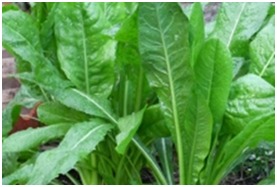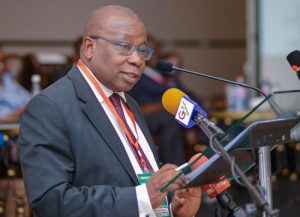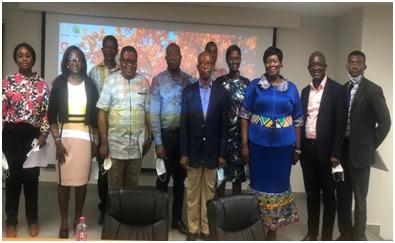INTRODUCTION
Health is the biggest wealth for a human being in his or her entire lifetime. One can survive without excess money but cannot survive without good health. The meaning of health has evolved over the time in keeping with the biomedical perspective. Considering the determinants of health, health generally is defined by the context in which individuals live, the lifestyles and choices of the individuals and societies.
The celebration brings together the gathering of all stakeholders, Policy makers, Researchers, Academia, Traditional Medicine Practitioners, largely represented by the Ghana Federation of Traditional Medicine Practitioners Associations (GHAFTRAM) as we consider building a wholistic and resilient health system, traditional medicine cannot be left off its hooks based on the Alma-ata declaration of 1978 where Traditional medicine practitioners were cited as part of healthcare delivery team.
Traditional Medicine also known as indigenous or folk medicine is defined by the World Health Organization as the sum total of the knowledge, skills, and practices based on the theories, beliefs and experiences indigenous to different cultures, whether explicable or not, used in the maintenance of health as well as in the prevention, diagnosis, improvement or treatment of physical and mental illness.
It comprises medical aspects of traditional knowledge that developed over generations within various societies and cultures before the era of modern medicine which in many cases has been orally passed for generations from person to person.
The role of Traditional Medicine in promoting and augmenting the health of the people of Ghana cannot be over-emphasized thus Traditional Medicine is still the first source of health care for about 80% of the population in developing countries including Ghana (World Health Organization, WHO) and it’s obvious that Traditional Medicine cannot be left off its hooks.

Ghana and the world at large, for the past decades have embraced Traditional Medicine Practice to complement the orthodox or biomedical practice for health care delivery.
Years before the introduction of the Allopathic Medicine Practice in Ghana, the populace depended solely on Traditional healers, Faith Healers, Traditional Birth Attendants, Wanzams (circumcisors) etc. for their healthcare needs. Even in this era of allopathic ascendency, Traditional and Alternative Medicine practice still plays a very huge role in providing for the health needs of people in the country.
Native doctors used leaves, stem bark, roots, seeds, flowers and fruits of plants and trees for medicinal and therapeutic purposes for the treatment and management of communicable and non-communicable diseases. The use of herbal medicine in the development and production of orthodox medicine is enormous.
Traditional medicine is as old as ancient civilization, from precolonial days, when our forbearers used traditional medicine for their healthcare needs.
Thus, traditional medicine has travelled many, many years from the days when there were no robust scientific community to where we are today. It’s gone through stages of metamorphosis and are yet to see that beautiful butterfly of traditional medicine.
COVID-19 IN GHANA
The current pandemic of COVID-19 that has affected many countries originated in Wuhan, China in late 2019. The single cause of this highly communicable disease is the novel coronavirus called Severe Acute Respiratory Syndrome Coronavirus 2 (SARS-COV2) until it was declared a global pandemic by the World Health Organization (WHO) in January, 2020.
In Ghana, the first official cases of COVID-19 were reported on 12 March, 2020. The Minister for Health announced the nation’s first two confirmed cases in Accra. The two cases were identified as people who had returned to the country from Norway and Turkey.
As at 9th of November, 2021, Ghana had recorded a total of 130,391 confirmed cases of COVID-19 with 1,188 mortality and 3,162,660 vaccines doses administered.
The COVID-19 Pandemic has impacted almost every corner of our lives, causing global economies to stall, changing the way we work and interact with our loved ones, and stretching healthcare systems to their limits. Governments around the world including ours have been forced to implement harsh restrictions on human activity to curb the spread of the virus.
POTENTIAL CONTRIBUTION OF TRADITIONAL MEDICINE TO COVID-19
Patients infected with COVID-19 show various unspecific symptoms ranging from fever, cough, myalgia, headache, anosmia and ageusia. Despite all the sophisticated health technologies around the globe and the various health efforts to curb the spread of the COVID-19 infection, there is still no known documented cure for COVID-19.The outbreak of COVID-19 caused a surge in the use of Traditional Medicine in many communities in various forms such as decoctions, bitters, concoctions, teas and steam inhalation in managing symptoms of the COVID-19 infection.
Indeed, Traditional Medicine has been the bed rock for the development of various drugs used today. With tens of thousands of plantsspecies on earth, we are endowed with an enormous wealth of medicinal remedies. Medicinal plants are rich in bioactive constituents that are responsible for their therapeutic activities. Such bioactive constituents are tannins, alkaloids, saponins, coumarins, essential oils, flavonoids, vitamins, micro and macro elements etc.
There are 252 essential medicines that had been considered by World Health Organization (WHO) for the treatment and management of communicable and non-communicable diseases. Out of these drugs, about 35% are exclusively from plant origin.
Many popular drugs such as Aspirin, Codeine, Caffeine, Reserpine, Morphine, Colchicine and Artemisinin Based Combination (ACT)- Coartem were all derived from plant-based extracts from various species of medicinal plants.
I believe strongly that with cooperate efforts by all stakeholders, policy makers, researchers, academia, traditional medicine practitioners, we will surely get a cure for covid-19 either as immune boosters, or to alleviate the symptoms or to cure the virus in its totality. History can always repeat itself as we retrospectively look at the discovery of many drug interventions, citing the discovery of Quinine for the treatment of malaria.
Before the 19th century, when there was an outbreak of malaria in Europe, many Europeans died without any medical help.The bark of the cinchona tree became their saviour. The bark of Cinchona was first dried, ground to a fine powder, and then mixed into a liquid (commonly wine) before being drunk. In 1820, quinine was extracted from the bark, isolated and named by Pierre Joseph Pelletier and Joseph Cavetto. Purified quinine then replaced the bark as the standard treatment for malaria. Quinine and other cinchona alkaloids including quinidine, cinchonine and cinchonidine are all effective against malaria.

Kwaku Agyeman-Manu – Health Minister
EFFORTS MADE BY GOVERNMENT
At the request of the Minister for Health, Traditional Medicine Practitioners in Ghana through GHAFTRAM submitted 33 Herbal medicinal products to Traditional and Alternative Medicine Directorate (TAMD) to be evaluated for the management of COVID-19 infection. The products were submitted to the Centre for Plant Medicine Research (CPMR) for analysis.
CPMR performed preliminary investigations on the products and reported on 18 Herbal medicinal products which passed the analyses and thus considered for their evaluation for managing COVID-19. TAMD, after several stakeholder consultations together with the Director and the Head of Clinical Pathology department of Noguchi Memorial Institute for Medical Research (NMIMR); have reached a consensus to undertake antiviral studies of the 18 selected Herbal medicinal products.
However, WHO has stated that, “Africans deserve to use medicines tested with the same standards as that of the rest of the world. Even if the medicines come from Traditional and natural sources, it is important for it to go through series of clinical trials to establish quality, efficacy and safety.”
In line with that, WHO, the African Union (AU)and Africa Centre for Disease Control (CDC) jointly launched the Regional Expert Advisory Committee on Traditional Medicine for COVID-19 Response. This Committee is accelerating the pace of research by supporting countries to collaborate on clinical trials of traditional medicines in line with international standards.
The West Africa Health Organization (WAHO) also set up an Advisory and steering committee to facilitate development and promotion of Traditional medicine in the West Africa subregion.
TAMD under the Ministry of Health took practical steps to analyze the experiences of the population using medicinal plants in Ghana and elsewhere leading to setting up of an expert committee to develop BASIC PROCEDURES FOR SAFETY AND EFFICACY STUDIES OF HERBAL MEDICINES.
This protocol has been validated by experts and in the process of publication for use in Ghana. This will help in the research and development of quality, safe and efficacious herbal medicinal products that will address public health, scientific and socio-economic concerns in contributing to Universal Healthcare (UHC).
CONCLUSION
When the world needed a solution for malaria fever, they turned to plant medicine and Quinine from Cinchona officinalis was the answer. In the same vein, the solution for the ongoing COVID-19 may be lurking in plant medicine.
As it said, “a journey of a thousand miles begins with a step”, we believe that the initiative by government through the Ministry of Health and our research institutions to research into our herbal medicinal products with potential for managing diseases will go a long way in the development and manufacture of herbal medicines for the management and treatment of diseases including COVID-19. We may end up producing the next “quinine” from Ghana.
We would like to commend the Minister for Health Hon.Kwaku Agyeman-Manu, Chief Director- Ministry of Health, Policy makers, Researchers, Academia and Practitioners for their efforts, their level of dedication in ensuring we produce herbal medicines which are safe, quality, efficacious and can stand the test of time globally
“We were attacked by COVID-19 because of unpreparedness, like soldiers, we are getting prepared to attack anyfuture pandemic”.
CORRESPONDING AUTHOR:
Dr. (Mrs.) Anastasia Yirenkyi
Director, Traditional and Alternative Medicine Directorate
Ministry of Health-Ghana
Co-Authors: Rudolph Mensah, Justice Ennin, Eunice Pobee.


